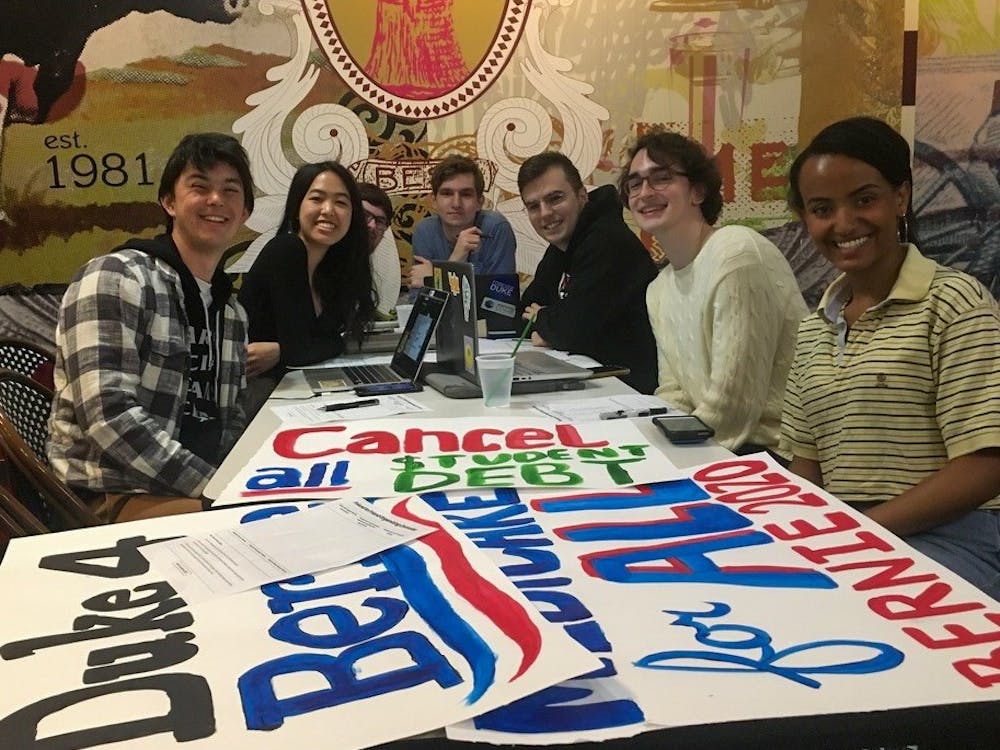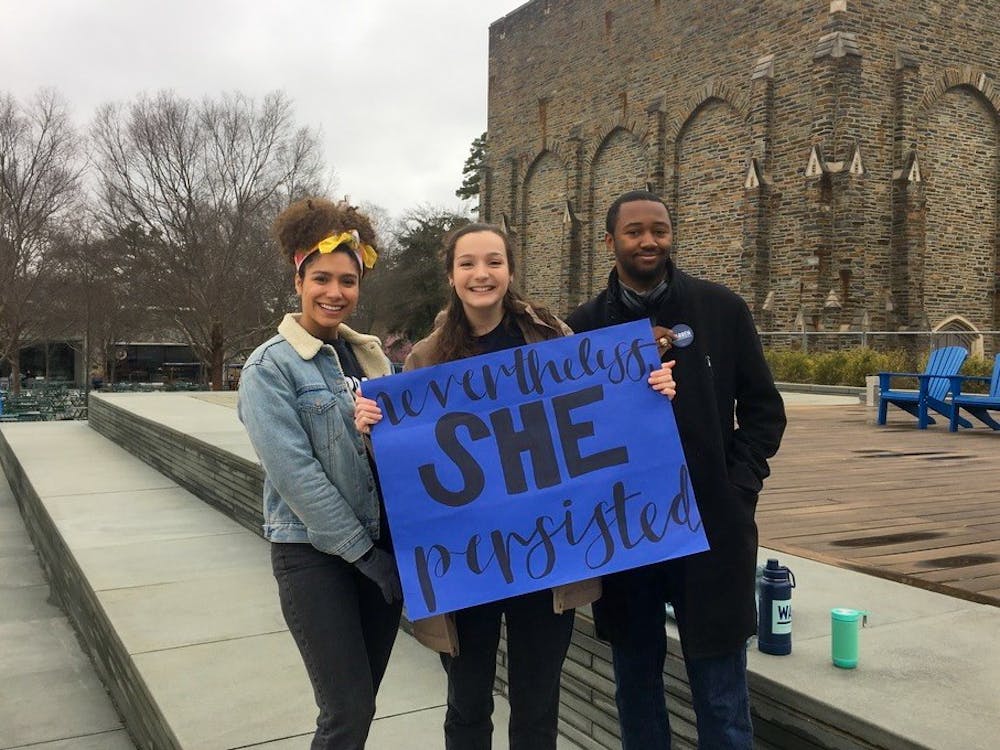With early voting in the North Carolina primary opening Feb. 13, many students will cast votes in the coming weeks for their presidential candidate of choice.
But for some, the onset of the primary season will not only decide the Democratic nominee. It will also render a verdict on their years-long campaign—from phone banking and tabling to debate watch parties and door-to-door canvassing—that now culminates at the polls.
In a chaotic Democratic election cycle that once featured over twenty candidates, Duke Students for Warren, Duke Students for Bernie and Duke Students for Pete have mobilized to campaign, whose candidates represent some of the frontrunners of the Democratic race. As the field of candidates narrows and the primary season begins, their efforts have only elevated in urgency.
All three groups have engaged in a wide variety of voter turnout efforts, such as tabling on the Bryan Center Plaza to promote voter registration and raising social media awareness for the campaign.
Student groups for both Vermont senator Bernie Sanders and Massachuesetts senator Warren both started organizing early last semester, while former South Bend mayor Pete Buttigieg’s started just this semester. The Facebook page for Duke Students for Bernie has 113 likes and 121 followers, Duke Students for Warren has 67 likes and 74 followers and Duke Students for Pete has five likes and five followers.
Pete for America contacted prospective members of Duke Students for Pete—seniors Kit Devine, Frankie Philips and Morghan Cyr—during finals season of last semester, and they have spent the beginning of this semester establishing a presence on campus.
However, they have gained less momentum relative to Warren and Sanders groups, reflecting the power of more progressive policies on a campus that leans left. The students for Buttigieg have focused on helping others see that “a progressive moderate can also have a good constituency among college students” and “creating that middle voice that doesn’t already exist,” according to Cyr.
But, at the end of the day, what’s most important is simply mobilizing voters to support Democratic candidates, even ones other than Pete, Cyr said.
Duke Students for Warren
On a damp Saturday this February, Duke Students for Warren gathered on the green couches near The Cafe in West Union to prepare for a day of canvassing on campus. Rachel Katz, a biomedical engineering Ph.D. student and one of the organization’s founding members, wore a yellow and orange bandana wrapped around her curly hair and a navy sweater with “Warren” emblazoned in white, underlined in light green, or as Katz calls it, “liberty green.”
Joining her were two other executive members, senior Betsy Broaddus, also donning Warren merch, and senior Andrew Donohue, dressed in a light blue jacket. Senior Maddy Flamm, another founding member, was not present. Broaddus, Flamm and Katz founded the campus group last year after independently applying to the Warren campaign to be campus leaders, and Donohue joined once the organization was established.
The four exec members—Katz, Broaddus, Donohue and Flamm—have a clear division of labor, according to Katz. Broaddus runs campus events and Donohue organizes canvassing.
Flamm had worked on recruitment for Mock Trial, so she also manages recruitment for the group. With her Adobe Illustrator experience, Katz became their digital manager. At the end of every email she sends out, she includes a “meme big fight hard” section, mimicking Warren’s “dream big fight hard” motto.
While waiting for more students to arrive, the group munched on brownies and breakfast bagels and debated potential candidates for Warren’s vice president.
“I like Booker,” Katz said. “He’s so likable.”
Eventually, a couple more students arrived, and Katz introduced them to their canvassing app called Reach.
Logging into the app with the Warren ID provides access to a script to share with interested voters and a section to fill in information for the national campaign. Katz cited three key goals in canvassing: encouraging voter turnout, gauging voters’ interest in Warren and providing information to voters, including her personal reasons for supporting Warren.
She likes to tell the story of how Trump’s travel ban jeopardized the future of one of her sorority sisters. Senator Warren spoke at their protest and personally met the sorority sister. Warren still remembers her to this day, Katz said.
Around mid-morning, the canvassers split into two groups. Katz and Broaddus headed to the Bryan Center Plaza, while the others planned to canvas in Marketplace. At the BC Plaza, they planted themselves in front of the blue, wooden chairs, along with a Warren sign and a speaker. Gray clouds loomed above, sprinkling rain.
Only six days remained until the Feb. 7 deadline for voter registration for the primary.
As students walked by, Katz yelled, “Are you registered to vote in the upcoming primary?”
Most hurried past or mentioned that they weren’t registered voters, though one or two students would occasionally stop.
“We should make a Tik Tok, and it should be about all the different types of way people reject us,” Broaddus said, laughing.
Since the group’s inception in August of last year, they have canvassed regularly on campus. They have also joined Warren volunteers in the community, grabbing Bojangles on the way and meeting in the parking lot behind Bed Bath & Beyond.
Relying on voter information from the Minivan app, the group knocked on Durham’s doors to ask people about their top candidates and issues. Other than canvassing, they also hold phone banking events, open to the community, that follow their general body meetings on Tuesday evenings.
Outreach from Warren’s campaign made it easy to start a chapter on campus, Katz said. Initially, the campaign provided training resources on student leadership, and the founding members participated in regular online calls with student chapters across the nation, one of which Warren attended herself.
With the results from Iowa and New Hampshire in the books, Sanders’ campaign has surged, while Warren’s has cooled. Nonetheless, Katz believes Warren has a real shot at winning. But even if Sanders or another Democrat were to clinch the nomination, she and the other executive members would vote, and even canvass, for that nominee.
“It is so important that we get Donald Trump out of the White House,” she said. “Back in 2016, Sanders really strongly felt his policies were best and Clinton, who was much more moderate, received the nomination. Then he went and knocked on doors for her, because he knew that it was bigger than his specific vision for the White House.”
As the morning progressed and Blue Devil Days tour groups shuffled by, a Carrie Underwood song pops on the speaker. Katz and Broaddus both start swaying and bobbing to the music.
“This is actually just impromptu karaoke,” Broaddus grinned.
Duke Students for Bernie

That same Saturday afternoon, a group of students met in the lower level of The Loop at a long table covered with plates of burgers and fries. Alongside them were “Duke 4 Bernie” and “Medicare For All” signs.
In theory, Duke Students for Bernie has five executive members: sophomore Chris Sheerer, sophomore Kayla Marr, sophomore Derya Oktay, first-year Max Golovsky and first-year Carson Termotto. However, they primarily view themselves through an egalitarian lens, preferring communal input to hierarchical leadership.
“We’re all equal,” Termotto said. “We just Bern.”
The group began with each individual explaining the personal influences that had led them to support Bernie, echoing the “My Bernie Story” workshop they had held recently. They pointed to Bernie’s commitment to restructice healthcare, promote union membership and implement the Green New Deal.
Sheerer, one of the more vocal members of the group, emphasized that the goals of Duke Students for Bernie transcend just securing Bernie’s election.
The Bernie campaign “doesn’t stop at getting Bernie to win,” he said. It means sustaining and spreading a “real movement for progressive politics in America.”
It’s a “political revolution,” Marr added.
Termotto, Marr and Sheerer founded the group after separately attending a Bernie summer program on campus canvassing, and the other executive members joined soon after. About one to two dozen people consistently show up to their general body meetings, which were held on Friday evenings and provided a space to discuss notable political events from the past week, such as the release of Warren’s Medicare plan in opposition to Sanders, according to Sheerer.
Their group activities on campus consist primarily of canvassing, debate watch parties and other special events, where they filled out forms listing friends to contact for the campaign. The group also engages regularly with the community to hold joint events for phone banking and canvassing, with Termotto acting as their coordinator on this front.
Similar to Duke Students for Warren, the group relies heavily on digital technology—specifically, the “Bern” app, which allows them to collect data on how likely voters are to support Sanders.
After sharing stories, they transitioned to filling out “friend to friend organizing exercises.” Besides the executive members, only a few other students have joined for the event.
Even though Bernie polls well with college students, it’s hard to evoke the same political passion among Duke students, Oktay said. He acknowledged that this stems from people’s limited time and many competing commitments.
“We are pushed into a bunch of other obligations that make electoral politics seem secondary,” Sheerer said.
As they scroll through their phone contacts and rank people according to receptivity to Bernie, friendly banter ensues. Sheerer and Oktay mull over people’s common perceptions of Bernie supporters.
“The number of times I’ve been called a Bernie bro is much higher than expected,” Oktay jokes.
He noted that they’re often branded as communists. But that doesn’t bother Sheerer much—part of Bernie’s influence was expanding the range of acceptable political dialogue.
“We need to normalize anarchy discourse,” he added, only half joking.
Editor's Note: An earlier version of this article incorrectly identified Carrie Underwood as Carey Underwood and liberty green as liberty blue. Duke Students for Warren was founded in August, not September, of last year. The Chronicle regrets the errors.
Get The Chronicle straight to your inbox
Signup for our weekly newsletter. Cancel at any time.

Chris Kuo is a Trinity senior and a staff reporter for The Chronicle's 118th volume. He was previously enterprise editor for Volume 117.

